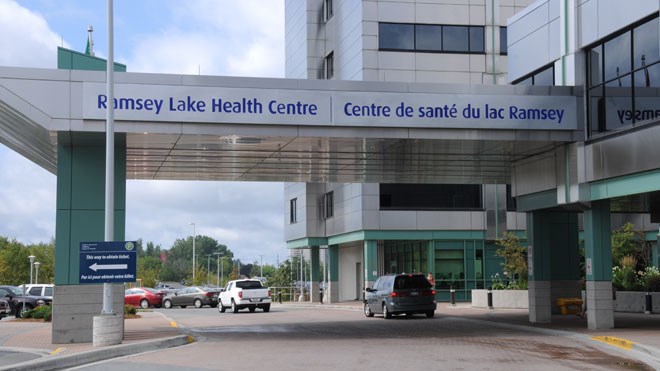While Health Sciences North managers continue crunching numbers to balance the hospital’s budget, the union representing registered nurses at HSN says 60.5 nursing positions have already been eliminated and 118,000 nursing hours cut since January.
Ontario Nurses’ Association president Vicki McKenna said the ONA local at HSN was given a list of positions to be trimmed and some of those cuts have been made. ONA represents the province’s 65,000 registered nurses, including more than 1,000 at HSN.
McKenna said morale is poor among HSN nurses because fewer of them are being asked to do more work and they are concerned about the impact that is having on patients.
Nursing cuts are hurting patients in intensive care, cardiology, nephrology, the psychiatric unit, the neonatal intensive care unit, surgical day care and surgical day short stay units, the birthing centre, seniors’ care, bariatrics, respiratory care and the outpatient clinic at the cancer centre, said McKenna in a column published last week.
“From the smallest premature babies to our seniors, the cuts will impact your care,” she said, with more cuts to come.
While HSN is cutting nursing positions, the number of beds and services has not decreased, said the union president.
“This is not the health care the people of Sudbury expect or deserve,” said McKenna.
Hospital can’t confirm numbers
David McNeil, former chief nursing officer at HSN, is now senior vice-president in charge of patient experience and digital transformation. McNeil said he couldn’t confirm ONA’s numbers because management is still working to determine which positions will be cut as it trims its budget.
The budget reflects a reduction of 51 full-time equivalent positions in all hospital unions, affecting 64 people, said McNeil. HSN’s human resources department has been working with the hospital’s three unions to inform their leadership about the positions that will be affected.
“We haven’t completed that process yet, (so it’s) very difficult to confirm those numbers,” McNeil said of the figures ONA is referencing.
“While on the one hand we are reducing, sometimes we are also adding so the net impact of all the changes will be much clearer as we move through the process,” he said.
However the numbers are worked out, McKenna said the reality is nursing hours are being reduced, resulting in fewer hours of nursing care to patients. Research indicates having sufficient nurses at the bedside results in better patient outcomes.
HSN’s board of directors, which approved this year’s budget and its cuts, has an obligation to balance its operating budget, said McNeil. That budget was also approved in a third-party validation review, he said.
McNeil insists the quality of care patients will receive from front-line nurses “will be world-class as it always has been. The nurses that are there are sufficient to take care of you (with) those reductions.”
McKenna agrees registered nurses will continue to put patients first, regardless of their workloads. There is no “silver bullet” to address a complex issue such as this, according to McKenna, but the solution starts with the provincial government adequately funding Ontario’s hospitals.
McNeil said HSN’s hours of nursing care per patient days is in line with the average hospital numbers in Ontario. But McKenna said Ontario hospitals are the most poorly staffed by nurses in Canadian hospitals.
HSN officials won’t know for a year exactly how many nursing and other union positions had to be cut, said McNeil. The first round of layoffs was in January this year including five senior managers.
Registered Nurses of Ontario, the professional association representing nurses, added its voice Monday to ONA’s concern about the loss of nursing jobs and hours at Health Sciences North.
The RNAO is calling on management at HSN and the North East Local Health Integration Network not to balance budgets on the backs of front-line nurses.
Maria Casas, policy executive network officer with RNAO’s Sudbury chapter, said nurses are the backbone of the health care system. Cutting their numbers saves money in the short term but results in poor health outcomes in the long run.
“As front-line nurses, we know that when RN care is cut, patients suffer,” Casas said in an open letter to HSN and the North East LHIN. Studies show that with fewer RNs to care for patients, the risk of patient complications such as pneumonia, sepsis, bed sores, urinary tract infections, cardiac failures and even death increases by seven per cent.
In a written statement, the NE LHIN said it is not involved in individual staffing decisions made by the organizations it funds. Rather it works with health service providers to ensure they are meeting the needs of patients and clients while meeting volumes and targets set out in accountability agreements with the LHIN.
After the third-party validation review, the LHIN provided $4.8 million more funding to HSN to alleviate service program pressures at the hospital, it said.
Nurses and other workers at HSN will stage a demonstration Sept. 14 to voice their concerns about the job cuts at the hospital.
Carol Mulligan is an award-winning reporter and one of Greater Sudbury’s most experienced journalists.
